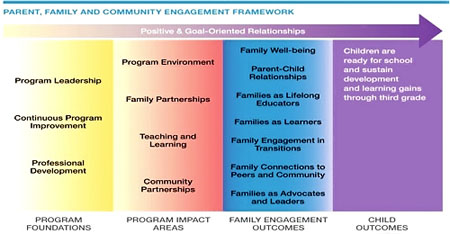Parent, Family, and Community Engagement Framework
Head Start Approach to School Readiness
- Parent, Family, and Community Engagement Framework [PDF, 273KB]
- Head Start Approach to School Readiness – Full Text [PDF, 473KB]

- Parent and family engagement in Head Start and Early Head Start is about building relationships with families that support family well-being; supporting strong relationships between parents and their children; and nurturing ongoing learning and development for both parents and children. The Parent, Family, and Community Engagement (PFCE) Framework is a roadmap for progress in achieving the types of outcomes that lead to positive and enduring change for children and families.
- The PFCE Framework was developed in partnership with programs, families, experts, and the National Center on Parent, Family, and Community Engagement. It is a research-based approach to program change that shows how an agency can work together as a whole—across systems and service areas— to promote parent and family engagement and children's learning and development.
- The PFCE Framework graphic demonstrates that when parent and family engagement activities are systemic and integrated across program foundations and program impact areas, family engagement outcomes are achieved. This results in children who are healthy and ready for school. Parent and family engagement activities succeed when they are grounded in positive, ongoing, and goal-oriented relationships with families.
Head Start and Early Head Start Parent and Family Engagement
As research suggests, parents and family members are more likely to become engaged in their young child's development and learning when they have positive and trusting relationships with those who support them.1 In Head Start and Early Head Start, these relationships focus on goals that families develop with the support of program leadership, staff, and engaged community partners. These goal-directed relationships are part of the two-generational approach of working with children and adult family members and distinguish Head Start and Early Head Start from other early childhood initiatives. They are most likely to take root within programs that take intentional steps to promote parent and family engagement.
Families play a critical role in helping their children to prepare for school and a lifetime of academic success. Agencies are required to consult with parents in establishing school readiness goals (45 CFR 1307.3 (b) (1) (iii), as amended). It matters when programs engage parents and families in their children's development and learning. In fact, research indicates that:
- Children with supportive home learning environments show increased literacy development, better peer interactions, fewer behavior problems, and more motivation and persistence during learning activities.2
- Among the youngest children, daily parent-child reading from infancy prompts cognitive skills as well as early vocabulary gains that lead to more reading and vocabulary growth3, a pattern of growth that has been compared to a snowball.
- Continued family engagement is important through the school years. Longitudinal studies of low-income children show that high family involvement offsets the risks of children growing up in low-income households and in households with low parent education.4
The launch of the PFCE Framework marks the beginning of a new wave of technical assistance resources that will be made available to programs in the coming year through the National Center on Parent, Family, and Community Engagement. The PFCE Framework can be used in program-wide strategic planning, program design and management, systems of continuous improvement, professional development for staff, and with governing bodies and parent groups. It can be used to help improve program services or to inform community partners about Head Start parent and family engagement goals and the importance of those goals for school readiness. The PFCE Framework is intended to inspire a renewed spirit of collaboration with families and community partners as programs identify and take next steps to engage parents, families, and the community to achieve better outcomes for children and families.
1 Bryk, A.S. & Schneider, B. (2003). Trust in schools: a core resource for school reform. Educational Leadership, 60(6). Lopez, M.E., Dorros, S., & Weiss, H. (1999). Family-centered child care. Cambridge, MA: Harvard Family Research Project.
2 Fantuzzo, J., McWayne, C., & Perry, M. (2004). Multiple dimensions of family involvement and their relations to behavioral and learning competencies for urban, low-income children. The School Psychology Review, 33(4), 467–480.
Weiss, H., Caspe, M., Lopez, M. E. (2006). Family Involvement in Early Childhood Education. Family Involvement Makes a Difference. Cambridge, MA: Harvard Family Research Project.
3 Raikes, H., Luze, G., Brooks-Gunn, J., Raikes, H.A., Pan, B.A., Tamis-LeMonda, C.S., et al. (2006). Mother–child book reading in low-income families: Correlates and outcomes during the first three years of life. Child Development 77(4), 924–953.
4 Dearing, E., Kreider, H., Simpkins, S., & Weiss, H. B. (2006). Family involvement in school and low-income children's literacy performance: Longitudinal associations between and within families. Journal of Educational Psychology, 98, 653–664.
Barnard, W.M. (2004). Parent involvement in elementary school and educational attainment. Children & Youth Services Review, 26(1), 39-62.
Parent, Family, and Community Engagement Framework. Head Start Approach to School Readiness. HHS/ACF/OHS. 2011. English.
Last Updated: March 16, 2012


